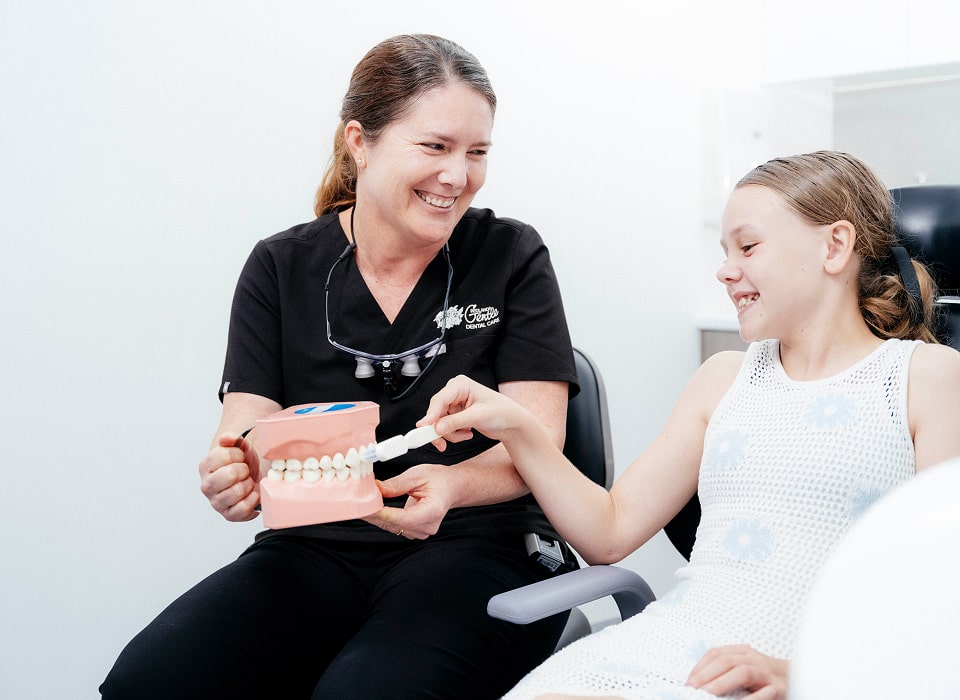Bring Back Confidence in Your Smile and Improve Your Oral Health with Restorative Dentistry
Why Choose Us
Why Choose Redlands Gentle Dental Care for Restorative Dentistry
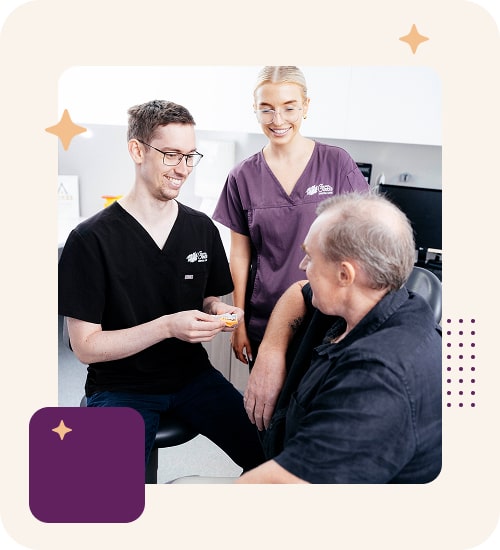
Accredited Dental Clinic Delivering
Safe and Reliable Restorative Care
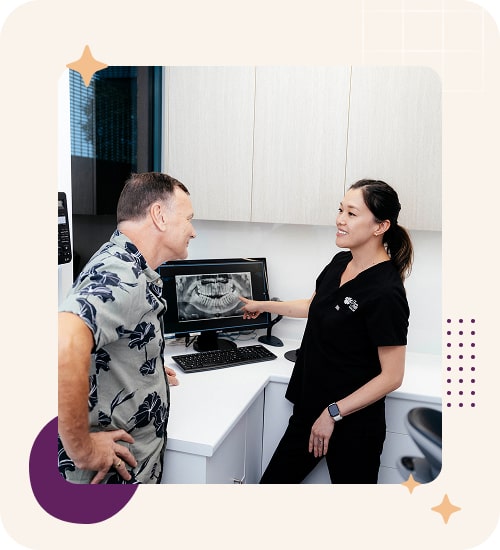
Advanced Technology for Precise and Comfortable Restorative Treatments
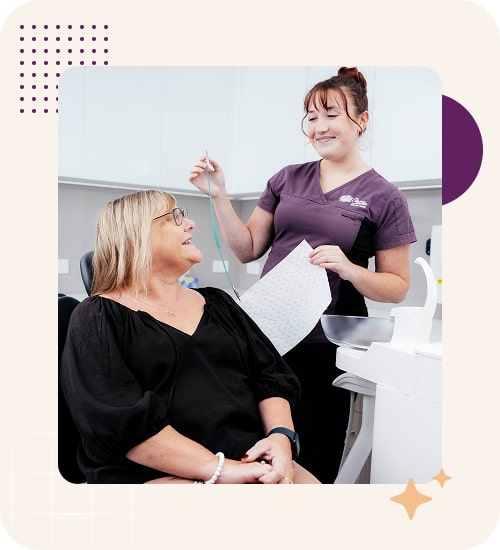
Over 40 Years of Experience Restoring Healthy Smiles

Flexible Payment Plans and Clear Pricing for Restorative Treatments
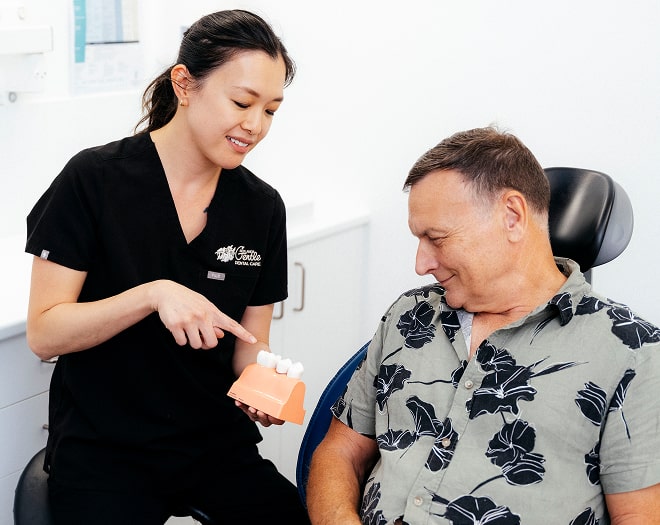
Be Comfortable Showing Your Smile Again with Restorative Dental Treatments
Two Convenient Locations
Quality Dental Services Made Accessible for Families in the Victoria Point and Capalaba Areas
Capalaba Dental Clinic
- (07) 3245 5511
- 149 Old Cleveland Rd Capalaba, QLD, 4157
- Free Parking Available
Victoria Point Dental Clinic
- (07) 3820 7777
- 2/1 Bunker Road, Victoria Point, QLD, 4165
- Free Parking Available
Dental Restorations
Our Restorative Dental Procedures Provide Care for Damaged or Missing Teeth
Restore Strength and Appearance with Custom Dental Crowns
Close Gaps Caused by Missing Teeth Through Dental Bridges
Custom-Made Dentures Designed to Restore Your Beautiful Smile
Gentle Root Canal Treatment for Damaged or Decayed Teeth
Precise Dental Inlays and Onlays for Tooth Restoration

Experience the Difference of Gentle Care with Us
How We Can Help
Learn How Restorative Dentistry Can Address Your Dental Problem
Unhappy With My Smile
I Have Missing Teeth
Unhappy With My Dentures
My Teeth Are Stained or Discoloured
Seeking Smile Improvement
Our Payment Options
Find What Works for Your Financial Needs With Our Dental Payment Options
Child Dental Benefits Schedule
Invest in your child's smile with the Child Dental Benefits Schedule (CDBS). This government program offers eligible families financial support for essential dental services, promoting good oral health habits from an early age.
The CDBS covers up to $1,095 over two years for basic dental care like check-ups, cleanings, and fillings for children aged zero to 17. Eligibility depends on Medicare status and specific government payments, making quality dental care more accessible to families.
Learn MoreDental Services for DVA Card Holders
Veterans deserve high-quality dental care, and the Department of Veterans' Affairs (DVA) program delivers just that. The program offers dental benefits that vary based on card type.
Gold Card holders receive comprehensive cover for clinically necessary treatments, from routine check-ups to advanced procedures. White Card holders are covered for dental care related to accepted service-related conditions or mental health needs. Our clinic proudly supports veterans by providing high-quality dental care to maintain their overall health.
Learn MoreHumm
Simplify your dental care payments with Humm, a flexible financing option that lets you smile now and pay later. This interest-free payment plan allows you to spread the cost of your dental treatments over time, making essential care more accessible.
Humm is available for various dental services, from routine check-ups to more complex procedures. With instant approval and the ability to manage your account online, Humm helps you prioritise your oral health without financial stress.
Learn MoreZip
We offer Zip to help patients manage treatment costs. With credit limits between $1,000 and $50,000, eligible patients can select flexible repayment terms from three to 60 months, making it easier to manage costs.
Zip is ideal for anyone needing dental care without upfront costs. The user-friendly app allows you to track payments easily, so you can stay on budget while prioritising your oral health.
Learn MoreSuperCare
With the help of SuperCare, eligible patients can release their superannuation funds early to access essential dental procedures. This option is suitable for families lacking sufficient health funds or available resources, covering services such as orthodontics, implants, and root canal therapies.
SuperCare's consultants guide you through the straightforward application process, simplifying what can often be complex. This service enables you to prioritise your family's oral health without the burden of upfront costs.
Learn MoreAfterPay
Experience the convenience of dental care with Afterpay, allowing you to receive treatments now and pay later in four easy instalments over six weeks. This payment option is available to anyone over 18, a practical choice for adults looking to enhance and maintain oral health.
With no interest charges when payments are made on time, Afterpay promotes responsible budgeting. Payments are automatically deducted from your linked debit or credit card for a smooth experience.
Learn MoreBupa Preferred Provider
Enjoy exclusive benefits and hassle-free claims when you choose our clinic, a Bupa Preferred Provider, for your dental health needs. Our patients can access a comprehensive range of services, including check-ups and major procedures, often at reduced out-of-pocket costs.
Members First Ultimate also offers 100% back on two dental check-ups and cleans every six months, making regular oral care more affordable. Our partnership with Bupa allows you to receive quality care while maximising your benefits.
Learn MoreHCF Preferred Provider
Experience affordable, high-quality dental care at Redlands Gentle Dental Care. As an HCF preferred provider, patients with eligible dental cover can access reduced out-of-pocket costs, no-gap services for selected treatments, and streamlined claims processing.
HCF members can take advantage of these benefits by choosing our clinic for their dental needs. Check your policy to understand covered treatments and annual limits, and let us help you achieve a healthier, brighter smile.
Learn Morenib Preferred Provider
Access professional dental care at our clinic, a trusted part of nib's First Choice network. As a nib Preferred Provider, we offer members the opportunity to receive quality dental care at agreed rates. This provides a transparent and straightforward experience for your dental needs.
Nib members benefit from reduced out-of-pocket costs and simplified claims processes at our clinic. To make the most of your cover, review your policy for applicable limits and service inclusions.
Learn MoreDiscover Restorative Dentistry Insights
Frequently Asked Questions
What does restorative dentistry include?
Restorative dentistry focuses on addressing damaged teeth and replacing missing ones. These procedures help improve both oral health and the appearance of teeth.
Here are some of the restorative dental procedures:
- Dental Crowns and Bridges:
Crowns reinforce a damaged or weakened tooth by covering it entirely. Bridges replace missing teeth by anchoring to neighbouring natural teeth. Both help maintain a complete smile and oral function. - Dental Fillings:
Fillings restore decayed and chipped teeth by filling the tooth structure with tooth-coloured composite material. This improves the appearance and function of teeth, preventing further damage. - Dental Implants:
Implants replace missing teeth by placing a titanium post into the jawbone. An artificial tooth is then attached to restore the entire tooth. - Dental Inlays and Onlays:
Inlays and onlays are custom-made for damaged teeth that need more than a filling but less than a crown. They help preserve healthy teeth and address issues like broken teeth. - Dentures:
Dentures are removable artificial teeth used to replace missing teeth. They restore oral function, improve the appearance of teeth, and maintain facial structure after tooth loss. - Root Canal Treatment:
This procedure removes infected tissue from the inner tooth to prevent its spread and preserve the tooth. A crown is often placed afterwards to keep the tooth functional.
To know which restorative procedure is right for you, it’s important to consult with your dentist.
What is the goal of restorative dentistry?
Restorative dentistry aims to restore the function, structure, and appearance of teeth. It addresses dental issues to promote better oral health and improve your smile.
Key objectives of restorative dentistry include:
- Restoration of teeth:
Restorative dental treatments address tooth damage caused by decay, wear, or injury. These treatments bring back teeth to their original form to maintain functionality. - Replacement of missing teeth:
Missing teeth can be replaced using treatments like dental implants, bridges, or dentures. These options close gaps between teeth and maintain proper alignment for oral health. - Improved appearance:
Natural-looking restorations can address discoloured teeth, misshapen teeth, and uneven gaps. They are made of restorative dental materials designed to enhance the appearance of teeth while preserving oral function. - Support for neighbouring teeth:
Restorative procedures help prevent adjacent teeth from shifting caused by missing teeth or gaps. This helps maintain a balanced bite and overall oral stability. - Prevention of complications:
Addressing dental issues early reduces the risk of further complications, such as the need for tooth extractions or more complex procedures. Early intervention supports long-term oral health.
Restorative dentistry procedures use advanced dental technologies and high-quality restorative materials. These treatment options focus on maintaining a functional and beautiful smile while promoting lasting oral health.
Can decayed teeth be restored?
Yes, decaying teeth can often be restored through restorative dentistry treatments. The type of care depends on the severity of the decay and the tooth’s overall condition. Restorative dental treatments focus on addressing the damage and reducing the risk of tooth decay spreading. In cases of minor decay, a filling may be sufficient. In contrast, more extensive decay may require procedures like root canal treatment, crowns, or even extractions and replacements, depending on the severity of the damage.
Restoring decaying teeth promptly can help avoid further complications. A treatment plan allows for care tailored to the patient’s needs, helping maintain the tooth’s durability.
Are dental implants considered restorative?
Is root canal therapy considered restorative?
Yes, root canal therapy is considered a restorative procedure. It helps address infected teeth by removing infected tissue from the inner part of the tooth. This process prevents the progression of infection and preserves the tooth’s structure, making it a highly effective and popular choice in restorative dentistry.
This procedure also relieves pain caused by deep decay or infection, enhancing the overall dental care experience. Modern techniques make root canal therapy efficient and reliable, allowing patients to maintain their oral health effectively.
How long will my dental restoration last?
The lifespan of dental restorations depends on several key factors. Examples include dental crowns and bridges, which can last 5-15 years, depending on the material, and dentures, which may need replacement after 5-8 years.
Factors that influence longevity include:
- Material used:
Strong and biocompatible materials contribute to durability. For example, dental implants with high-quality materials can last 20 years or more for the implant post, while attached crowns or bridges last 5–15 years. - Type of restoration:
Some restorations, like implant-supported prosthetics, are designed for long-term use, while others, such as dentures, require more frequent adjustments. - Oral hygiene practices:
Proper cleaning routines help prevent decay or gum problems, which can affect the longevity of the restoration. - Daily use and bite forces:
Grinding or excessive pressure on restorations, particularly on bridges or dentures, can wear them down faster. - Regular dental visits:
Consistent dental check-ups allow the dentist to identify and help address any problems early, preventing further complications. - Changes in oral anatomy:
Natural changes in the mouth, such as bone loss or gum recession, may require adjustment or replacement of restorations. - Lifestyle choices:
Smoking or consuming hard or sticky foods can shorten the lifespan of teeth restorations.
Considering these factors, restorative dentistry services help maintain improved function, smile aesthetics, and long-lasting results.
What materials are commonly used for dental restorations?
Dental restorations use a variety of materials, each selected for its unique qualities to meet the needs of the patient and the type of tooth restoration. These materials are designed to improve function, aesthetics, and oral health.
Below is a list of commonly used materials with detailed descriptions:
- Composite Resin
- Composite resin is a tooth-coloured material that bonds directly to the tooth surface.
- It is used in simple fillings to restore cavities in teeth while maintaining a natural appearance.
- This material is also ideal for cosmetic dentistry treatments, such as dental veneers, to restore chipped teeth or to close small gaps between teeth.
- Porcelain
- Porcelain is a durable ceramic material that mimics the natural appearance of teeth.
- It is commonly used in crowns or bridges.
- Porcelain veneers are attached to the front surfaces of teeth to improve smile aesthetics.
- Titanium
- Titanium is a biocompatible metal widely used for implant posts, which serve as artificial tooth roots.
- It integrates naturally with the jawbone, providing a stable foundation for dental implants.
- Titanium posts are used to support a range of restorations, including crowns, bridges, and dentures, making them essential in replacing missing teeth.
- Zirconia
- Zirconia is a metal-free and strong material that offers high durability and aesthetics.
- It is an alternative to titanium for implant posts, especially for patients who prefer non-metal options.
- Zirconia is also used in fabricating crowns and bridges to restore teeth with a natural appearance and reliable strength.
- Metal Alloys
- Metal alloys, such as gold, nickel, and chromium, are known for their strength and wear resistance.
- These materials are often used to create abutments, which connect implant posts to prosthetic teeth.
- They are also used in crowns and bridges, particularly in areas like molars requiring enhanced durability.
These materials provide the foundation for a wide range of restorative dental treatments. By selecting the appropriate material for each procedure, dentists can achieve durable, functional, and visually pleasing restorations tailored to individual needs.
What is the difference between dental crowns and bridges?
Dental crowns and bridges are restorative dentistry treatments designed to address decayed or damaged teeth and missing teeth, respectively.
Here is a description of each and how they differ:
- Dental Crowns
- A crown is a cap placed over a damaged or weakened tooth to restore shape, size, and function.
- It is commonly used when a tooth is fractured, has a large cavity, or after a root canal procedure.
- They are placed on individual teeth and are not used to replace missing teeth.
- Dental Bridges
- A bridge replaces one or more missing teeth by anchoring a replacement tooth to adjacent natural teeth or implants.
- It involves using abutment teeth on either side of the gap for support.
- The replacement tooth, called a pontic, is suspended between the abutment teeth to fill the gap.
Key differences:
- Purpose: Crowns restore a damaged tooth, while bridges replace missing teeth.
- Application: Crowns cover an individual tooth, whereas bridges involve multiple teeth, including abutments and pontics.
- Structure: A crown works on a single tooth, while a bridge spans a gap using neighbouring teeth for support.
Both dental crowns and bridges are effective treatments for improving smile aesthetics, restoring oral function, and preventing further dental issues.
How many dental appointments will I need for my restorative treatment?
The number of dental appointments required for restorative dental procedures depends on the type of procedure and complexity of the case. Here’s a general guide:
- Simple Fillings:
A simple filling to address a tooth cavity usually takes one appointment. This includes preparing the tooth and placing the filling material. - Dental Crowns and Bridges:
These procedures generally require at least two visits. The first appointment involves preparing the teeth and taking impressions. The second visit is for fitting and placing the final restoration. - Dental Implants:
Implants often require several appointments over several months. This includes the initial placement of the implant post, healing time, placement of the abutment and the attachment of the crown or bridge. - Root Canal Therapy:
Depending on the complexity of the procedure, most root canal treatments take one to three visits. - Dentures:
Complete or partial dentures take multiple appointments. These involve impressions, fittings, and adjustments to create a comfortable and functional result.
The total number of visits also depends on your personalised treatment plan. Discussing your needs with your dentist will help you understand the timeline and plan appointments accordingly.
What is the typical cost range for restorative dental treatments?
The cost of restorative dental care depends on several factors, including the type of procedure, the complexity of the treatment, and the materials used.
Below are the key factors affecting costs and the usual price ranges for common restorative dental treatments.
- Type of procedure
- The type of restorative dental treatment significantly influences the cost.
- For example, a simple dental filling can cost up to $275, while a complex filling may cost up to $475. In comparison, dental implants are more invasive and range between $4,500 and $5,000 per tooth for straightforward cases.
- If additional procedures, such as bone grafts or sinus lifts, are needed, the cost can increase to $11,500 per implant.
- Complexity of the treatment
- More complex cases usually require additional time, materials, experience, or multiple steps, which can increase the cost.
- Root canal therapy costs between $2,000 and $3,400 without a crown.
- Dental inlays or onlays start at around $850 for one surface, with additional surfaces adding to the cost.
- Materials used
- Choosing materials like porcelain, metal, or composite resin can also affect the price.
- Dental crowns made from high-quality materials usually cost between $1,700 and $1,900. Bridges involving multiple teeth can cost up to $1,800 per tooth.
- Extent of the restoration
- Restorations involving multiple teeth or large areas, like dentures, are priced higher.
- Full upper and lower dentures can cost up to $4,000, while a single upper or lower denture costs up to $2,200.
- Additional procedures
- Some treatments may require preparatory or supplemental procedures, such as bone grafting or adjustments, which increase the overall cost.
- For example, the cost of a dental implant rises significantly if bone grafting or a sinus lift is needed.
The cost of restorative dental care varies based on individual needs, and the prices mentioned above are estimates.
At Redlands Gentle Dental Care, we provide dental consultations to assess your oral health and create a tailored treatment plan. Contact us to schedule your consultation today!
